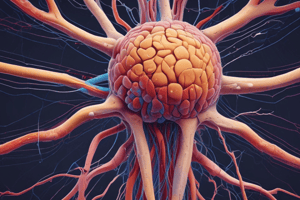Podcast
Questions and Answers
What is the basis of excitability in living cells?
What is the basis of excitability in living cells?
What creates an electrical potential difference between the inside and outside of the cell?
What creates an electrical potential difference between the inside and outside of the cell?
Which cells exhibit excitability?
Which cells exhibit excitability?
What is the preferred stimulus for stimulating nerves?
What is the preferred stimulus for stimulating nerves?
Signup and view all the answers
What are the events that excite an organism termed?
What are the events that excite an organism termed?
Signup and view all the answers
Study Notes
- The cell membrane's selective permeability creates a difference in ionic composition between intracellular and extracellular fluids, leading to a trans-membrane potential or membrane potential.
- Membrane potential exists across the membranes of all body cells, varying moment to moment based on cell activities and responsible for the property of excitability.
- Excitability is the ability of tissues to respond to changes in environments, with nerves and muscles being the most excitable.
- Nerves can be stimulated by various stimuli, including electrical, mechanical, chemical, and thermal; electrical stimuli are preferred due to similarity to internal stimuli, controllability, measurability, and lack of tissue damage.
- The nervous system, primarily composed of neurons and glial cells, is responsible for transmitting information throughout the body, enabling coordinated responses to stimuli.
Studying That Suits You
Use AI to generate personalized quizzes and flashcards to suit your learning preferences.
Description
Test your knowledge on the principles of membrane potential and excitability in the nervous system. Explore the selective permeability of cell membranes and the ionic composition of intracellular and extracellular fluids.




